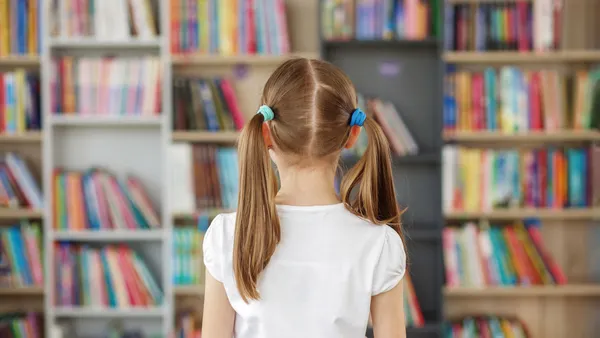Dive Brief:
- Spokane Public Schools (SPS) in Washington, facing a projected $31 million deficit, announced last week that it will eliminate all school librarian positions in the coming year. This reflects a growing trend as the number of full-time school librarians and media specialists in Chicago has been slashed nearly two-thirds from 2014 to 2018 and more than 9,000 full-time positions — or 15% of the total number — were eliminated from schools nationwide from 2009 to 2016, the Spokesman-Review reports.
- SPS plans to have classroom teachers supervise students in the library, place experienced school librarians in classrooms and lay off school librarians with less experience. A spokesman for the district said that students will still access library materials in the same way and the library will be open for the same number of hours each week.
- However, Stephanie Oakes, an experienced school librarian in the district and a children’s book author, said the district will suffer from the lack of trained librarians because they do more than order and shelve books. They also offer specialized help to students and teachers in the fields of library science, lesson planning and technology, and help improve student achievement and test scores.
Dive Insight:
As school districts prioritize their budget needs for the coming year, there is a temptation to cut school librarian positions or reduce them to part-time status as some school districts are doing. The decision in SPS also comes as President Donald Trump, for a third time, has proposed to cut federal funding for the Institute for Museum and Library Services, which provides grants to both public and school libraries.
While library operations in some districts may need to be streamlined, cutting them out altogether seems like a pathway to failure considering the many roles that modern school librarians or media specialists serve. School librarians and media specialists support literacy efforts by helping connect the right students with the right books and resources, something that most classroom teachers are unlikely to have enough knowledge of available materials to do. They also provide other opportunities to connect with literature by offering events such as poetry slams.
Research supports the impact that school librarians make on academic achievement, especially with regard to reading and writing scores. For instance, a Pennsylvania study cited in the Spokesman-Review article notes that 1.6% fewer students tested at the below basic level in reading when they had access to full-time librarians. The difference was even greater for minority students and those with disabilities, averaging at about a 5% improvement for those populations. Other research also supports the academic benefit of school librarians and demonstrates how they contribute to learning gains.
But modern school librarians offer so much more. They also teach digital literacy and digital citizenship in a day of easy access to misleading information and fake news. Many oversee makerspaces in libraries and learning centers that have been updated to meet a host of student needs. And they support teachers and administrators by researching information, helping with lesson plans, culling websites to create links that provide the most relevant information, and assisting with technology needs.
Rather than eliminating these positions, school administrators may need to find ways to use their skills more effectively in revamped media centers. A Scholastic Administrator article noted that trained school librarians can improve the student-to-teacher ratio, help provide on-site professional development, free up teacher time by helping them find needed resources, and aid administrators with their research needs. In today’s changing world of technology and information, many school leaders see school librarians and media specialists as an essential part of the school environment.










